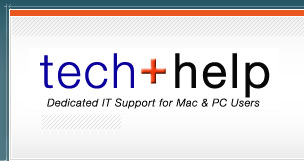Have a Plan, Sleep Well
Natural disasters, hard drive failures, mistakenly deleted files or employee sabotage can strike at any moment.
Do you have a plan to keep your valuable computer data safe? If you don't, you're not alone, many businesses have neglected this all important area.
A recent study by the University of Texas estimates that more than 50% of the small and midsize businesses that lose computer data in a disaster go out of business within two years. Following the Katrina Hurricane, many small and medium businesses lost all important data because they never made offsite backups high priority.
However, tech disasters don't have to be major calamities like earthquakes, hurricanes or fires. Some of the most damaging data losses occur when simple things go wrong – like an overflowing toilet from the office above that spills into your server room. Or heaven forbid, the theft of you business laptop from your favorite internet cafe.
Start with onsite plan
If you're just starting up a small home office or have never organized a backup plan, the best place to begin is with your critical data that resides on YOUR computer. Buy yourself an external hard drive with enough storage to handle all your data now and more as your files grown on your computer. Plan for two years worth of growth. In example, if you have a 200 GB drive make sure you buy at least 500 GB external drive. More if you work with digital photos and/or video. Drives per gigabyte are relatively cheap. You can buy a 1 TB drive (1000 gigabytes) for under $120. Do a bit of research some drives may only be compatible with USB 2.0. In most cases that may work fine. If you're on a Mac system look at drives with Firewire 400 or better yet, FW 800. They offer faster copy speeds than USB only connections.
Once you have the drive setup you can manually backup important files to this drive. However the best way is to setup a daily or weekly backup plan. With the current crop of system software backup offerings from Apple and Microsoft Windows, there's no excuse to lose data. You can schedule backups daily with these offerings and sleep well that your data is safely tucked away on a backup drive. Also see the excellent set of articles in Macworld on Time Machine
Next step: An off-site plan
One of the most critical plans to develop is making plans to backup data that resides off your premises. Rotating these data backups can be a chore but well worth the effort. One of our clients schedules the rotation of its data offsite using a second set of external drives to a bank safety deposit box. This includes backup data and a complete clone of the server's content. It's a great insurance policy in case of a natural or man-made calamity. We like CrashPlan for the simple interface and reliability.
Many larger companies do a daily replication of there data to other areas of the country. After Hurricane Katrina, the businesses that survived, without major interruption, had sophisticated backup strategies that involved replicating data each night from offices in Louisiana to data centers in states thousands of miles away from the Gulf area. Note: These plans are often very expensive and require large (and pricey) internet pipelines.
How we can help
With tech+help we assess your backup strategy and offer a detailed written plan. At the basic level we usually recommend starting with a monthly backup rotation off-site and then work toward a weekly offsite backup. We can even help setup a pickup service that comes to your office weekly and rotates the backup drives to a secure location. This might be through Cor-o-van or Iron Mountain in the San Francisco Bay Area. Both offer reliable service and each will pickup and store data in one of their secure facilities.
Call Russ Curtis today at (415) 533-1357 or e-mail him for more information.
|

